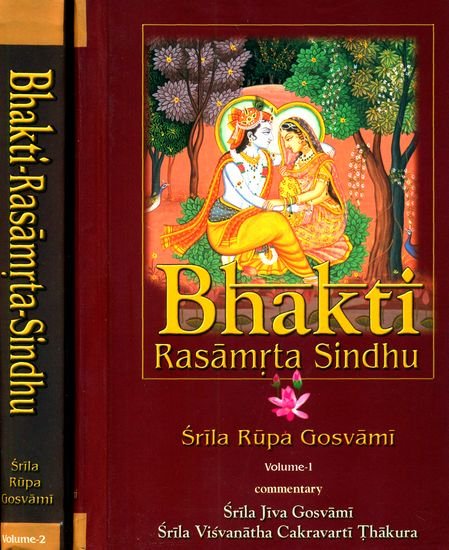Bhakti-rasamrta-sindhu
by Śrīla Rūpa Gosvāmī | 180,912 words
The English translation of the Sri Bhakti-rasamrta-sindhu verse 2.1.184; a medieval era Sanskrit book, written by Rupa Goswami (fl. 15th century) which represents a devotional (bhakti) masterpiece. In this work Goswami describes the nature and different forms of pure love (rasa) as well as various other topics on Vaishnavism and devotion.
Verse 2.1.184
Sanskrit text, Unicode transliteration and English translation:
यथा प्रथमे (१.१५.११) —
यो नो जुगोप वन एत्य दुरन्त-कृच्छ्राद्
दुर्वाससो’रि-रचिताद् अयुताग्र-भुग् यः ।
शाकान्न-शिष्टम् उपयुज्य यतस् त्रि-लोकीं
तृप्ताम् अमंस्त सलिले विनिमग्न-सङ्घः ॥२.१.१८३॥yathā prathame (1.15.11) —
yo no jugopa vana etya duranta-kṛcchrād
durvāsaso’ri-racitād ayutāgra-bhug yaḥ |
śākānna-śiṣṭam upayujya yatas tri-lokīṃ
tṛptām amaṃsta salile vinimagna-saṅghaḥ ||2.1.183||
English translation
Sanskrit text, Unicode transliteration and English translation:
अन् एxअम्प्ले fरोम् थे Fइर्स्त् चन्तो ओf श्रीमद्-भागवतम् [१.१५.११]: “दुरिन्ग् ओउर् एxइले, दुर्वासा मुनि, wहो एअत्स् wइथ् हिस् तेन् थोउसन्द् दिस्चिप्लेस्, इन्त्रिगुएद् wइथ् ओउर् एनेमिएस् तो पुत् उस् इन् दन्गेरोउस् त्रोउब्ले. अत् थत् तिमे हे [लोर्द् कृष्ण], सिम्प्ल्य् ब्य् अच्चेप्तिन्ग् थे रेम्नन्त्स् ओf fओओद्, सवेद् उस्. ब्य् हिस् अच्चेप्तिन्ग् fओओद् थुस्, थे अस्सेम्ब्ल्य् ओf मुनिस्, wहिले बथिन्ग् इन् थे रिवेर्, fएल्त् सुम्प्तुओउस्ल्य् fएद्. अन्द् अल्ल् थे थ्रेए wओर्ल्द्स् wएरे अल्सो सतिस्fइएद्.”
(५३) नित्य-नूतनः —
सदानुभूयमानो’पि करोत्य् अननुभूतवत् ।
विस्मयं माधुरीभिर् यः स प्रोक्तो नित्य-नूतनः ॥२.१.१८४॥An example from the First Canto of Śrīmad-Bhāgavatam [1.15.11]: “During our exile, Durvāsā Muni, who eats with his ten thousand disciples, intrigued with our enemies to put us in dangerous trouble. At that time He [Lord Kṛṣṇa], simply by accepting the remnants of food, saved us. By His accepting food thus, the assembly of munis, while bathing in the river, felt sumptuously fed. And all the three worlds were also satisfied.”
(53) nitya-nūtanaḥ —
sadānubhūyamāno’pi karoty ananubhūtavat |
vismayaṃ mādhurībhir yaḥ sa prokto nitya-nūtanaḥ ||2.1.184||
English translation
(53) nitya-nūtanaḥ: ever-fresh —
“He who astonishes by appearing unrelished, though he has already been relished with His sweet qualities, is called ever-fresh.”
